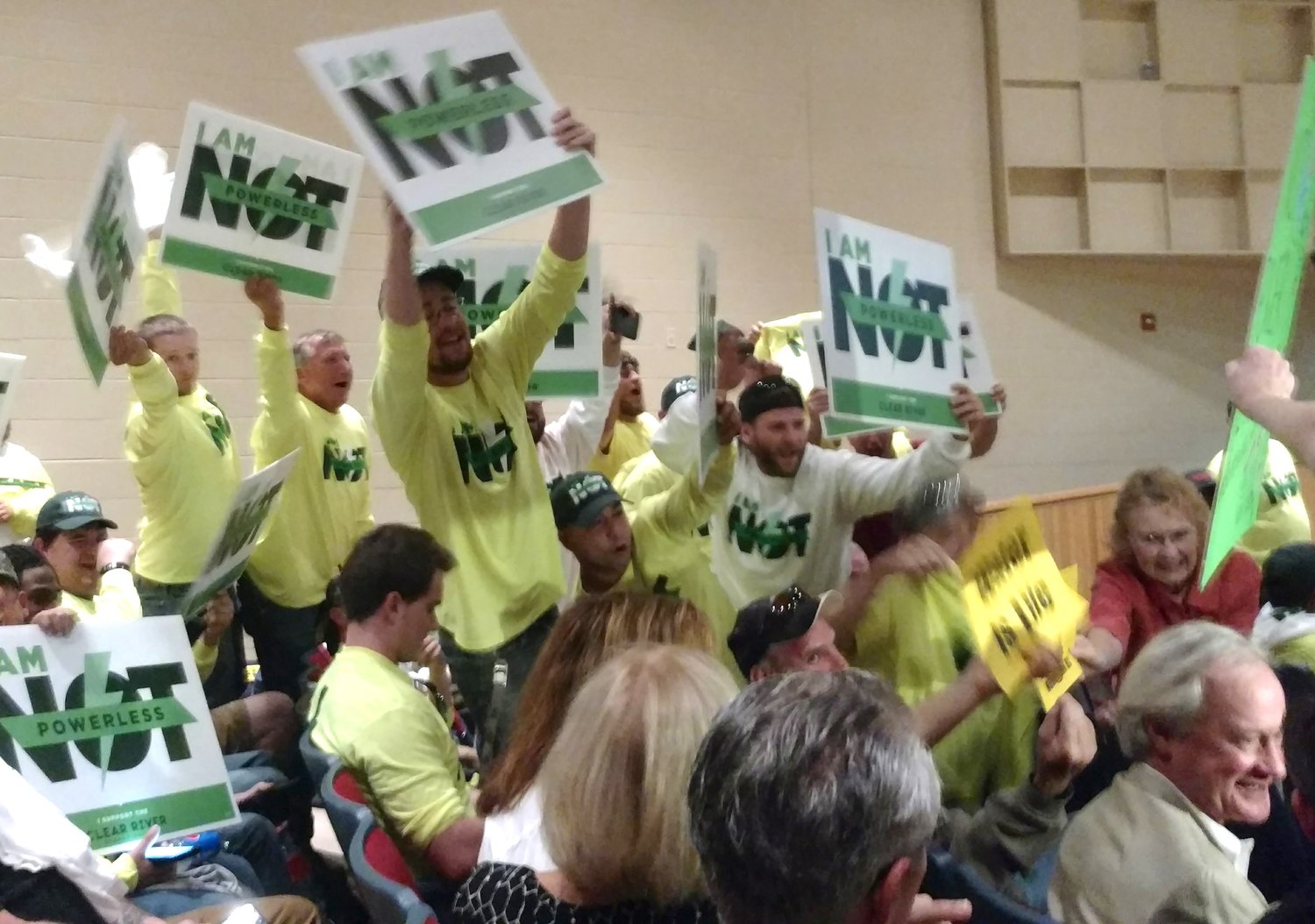Videos and text by TIM FAULKNER/ecoRI News staff
 |
| Union members who support the power plant had their own T-shirts and signs. They were loud but left early. (Tim Faulkner/ecoRI News photos) |
The fifth and likely
final public hearing for the proposed fossil-fuel power plant was like many of
its predecessors: crowded, boisterous, and overwhelmingly against the $1
billion energy project. But there were several notable differences from prior
meetings.
First, the opposition
was well versed in the intricacies of the natural-gas/diesel facility.
Rather
then tell personal stories and the harm to the town's rural heritage, many
stuck to the issues that the Energy Facilities Siting Board (EFSB) will be
weighing as it judges the fate of the Clear River Energy Center. Namely,
whether its electricity is needed; the environmental threats; and its
influence on the economy.
Many opponents referred
to reports and analysis of the regional grid operator, ISO
New England, showing that the added 1,000-megawatts of power isn't
needed to meet future power needs, as wind, solar, and even other natural-gas
power plants are developed.
Local resident Jason
Olkowski noted that ISO New England warns of the region's lopsided reliance on
natural-gas power, the meager savings the proposed power plant would have on
natural-gas prices, and a lack of new pipeline infrastructure.
“It’s not needed,"
he said. "It's not wanted, and as a state we can do better."
North Providence
resident Bill Eccleston told the EFSB that the land was part of a
25-square-mile wildlife habitat that conservation groups have identified as
some of the most ecologically valuable in southeastern New England.
He
criticized the Rhode Island Department of Environmental Management for ignoring
the importance of the habitat in its advisory opinion to the EFSB.
“The exceptional
biodiversity of the power-plant site is presented to you in isolation of its
greater ecological context," he said. "The forested context within
which could be operating for the next half century a major industrial facility,
far from any industrial-zoned land, a noisy, glaring, 1,000-megawatt power
plant emitting 3.6 million tons of carbon dioxide a year. What indeed is wrong
with this picture?”
The four-hour hearing
held Oct. 10 was the last chance for direct public comment, but a new round
of expert testimony will
be debated by lawyers for Invenergy and power-plant opponents beginning Oct. 31
at the EFSB office in Warwick.
The meetings are open to the public and will run
through the end of January. EFSB chairwoman Margaret Curran said the hearings
will be followed by several weeks of deliberation, all of which will be held in
public as the three-member board can't discuss the proposal in private.
One issue the EFSB will
likely consider is the question asked — and unanswered — repeatedly since the
hearings began 18 months ago: Why is the proposed site on Wallum Lake Road
suitable after it was rejected for a power plant in 1988?
The EFSB is also going
to have to grapple with the issue of how much truck traffic the power plant
will create.
Critics claim the project's developer, Chicago-based
InvenergyThermal Development LLC, hasn't given a full estimate. Opponents estimate
about 1,000 trucks per month will deliver water and other materials to and from
the power plant.
One of the most moving testimonies
of the night came from Matthew Moreau. The Woonsocket resident blasted fellow
union members for showing up to be considered for future construction projects.
Moreau said he held back from speaking out against the project at previous
hearings out of fear of losing his job.
“I’m not going to have a
job tomorrow,” he said. “I’m finally happy I get to say something.”
Raging Granny Jan Creamer of South
Kingstown sang for 3 minutes for her testimony.
Two members of the Narragansett Indian Tribe spoke out
against the power plant and vowed to challenge a decision by tribal leaders to
agree to sell water from tribal land in Charlestown to Invenergy.
“The tribe does not
support this," Narragansett Indian Tribe council member Randy Noka said.
An estimated 500 people
attended the hearing in the high school auditorium, which has a capacity of
600.
Some 72 people spoke against the project. Three supported it. All three represented union and business groups.
Some 72 people spoke against the project. Three supported it. All three represented union and business groups.
